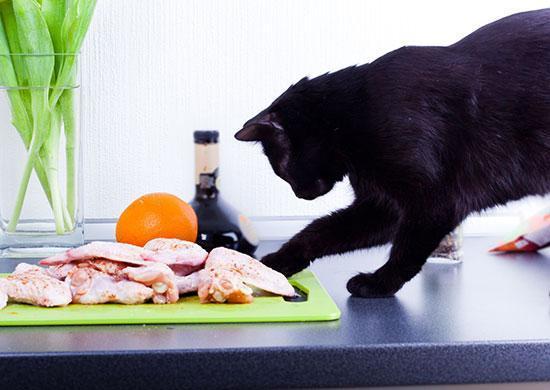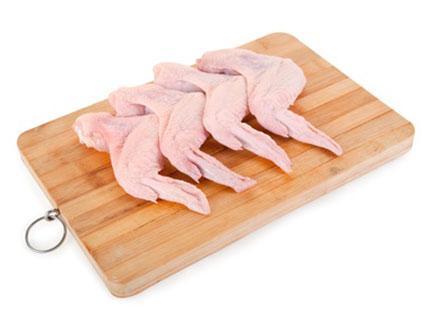This content is archived from the Feline Nutrition Foundation
Answers: Raw Food for Cats, What About Eating Bones?
- Updated: Monday, May 06, 2019 02:02 PM
- Published: Saturday, March 09, 2013 12:44 PM
- Written by Guillermo Díaz. MV
 I am new to feeding raw cat food and I still feel a little uneasy giving my kitty meat with bones. Some of the food I feed her is ground, so the bones are in the mix. But, I have been told it is good for a cat's dental health to eat meat pieces with bones in them. What should I feed her? What's safe to give her? Also, why do you recommend feeding bones over just using a calcium supplement?
I am new to feeding raw cat food and I still feel a little uneasy giving my kitty meat with bones. Some of the food I feed her is ground, so the bones are in the mix. But, I have been told it is good for a cat's dental health to eat meat pieces with bones in them. What should I feed her? What's safe to give her? Also, why do you recommend feeding bones over just using a calcium supplement?
Cats are obligate carnivores. Cats living in the wild chase and kill small prey such as rodents, mice, squirrels, rabbits, reptiles, amphibians, birds, insects and small fish. Feeding raw food for cats is our way of getting as close as is practical to a diet that they evolved to eat. If we were able to see a cat eating their prey in the wild, we would see that the kitty eats the whole thing from head to toe. That means hair, feathers, flesh, bones, blood, entrails, organs, glands, digested and undigested food in the stomach and intestines, head, feet and tail. The only parts they do not digest and utilize are teeth and nails. This way, Mother Nature makes sure cats get all of the nutrients they need to thrive and live a healthy life. The bones presented in the prey contain nutrients, such as calcium, in a perfect, balanced way.
Which Bones to Feed?
When feeding raw bones to cats, be sure that they are small enough that your cat can chew on them. Examples include chicken wings, ribs and necks, Cornish Hen cuts, many cuts from small rabbits and many other small poultry such as quail. You can also offer small whole prey such as mice and chicks. Cats are not silly. They will screen thoroughly to make sure the bone is suitable to chew on. You must observe how your cat attacks bones, and take note of her next couple of bowel movements to see whether she is eating the actual bone. If the stools are bloody, if there is any indigestion, discomfort, gas, vomiting or bloating or if there are any shards of bone in the stool, then discontinue feeding whole bones. If your cat is constipated, you may need to reduce the amount of bone you are feeding.
Never Cook or Microwave the Bones
Doing so can cause the bones to splinter, making them sharp with the possibility of puncturing the intestinal system.¹ This could cause internal bleeding, constipation, rectal bleeding and blockages in the gastrointestinal system.²
Raw Bones and Oral Health
When you feed a cat bone-in cuts of meat such as chicken wings or necks, the cat has to use its side teeth to chew and cut the meat into pieces small enough to swallow. This vigorous use of the side teeth helps to keep the teeth clean, the gums stimulated and the jaws exercised. This is not only beneficial to their dental health, but also helps to keep them mentally stimulated.³ Keeping the teeth and gums healthy is important because infection or disease in the mouth can affect other parts of the body.⁴
The Importance of Calcium
Calcium is the most abundant mineral in the body. By the time you see symptoms of a calcium deficiency, your cat has often been calcium deficient for months or years. That is why it is so important that everyone who has their kitten on a raw food program be sure their animal is getting a sufficient level of this important nutrient.
 Early signs of a calcium deficiency can include restlessness, stiffness, weakness, irritability, muscle tremors and hypersensitivity to touch and sound. More advanced signs of a calcium deficiency include: arthritis, skin and coat problems, broken and/or bent pasterns, weak, easily injured ligaments, broken bones, patella luxation, severe pain, most often in feet, legs or hips, heart problems such as arrhythmias, constipation, diarrhea, incontinence and kidney, bladder and liver problems.
Early signs of a calcium deficiency can include restlessness, stiffness, weakness, irritability, muscle tremors and hypersensitivity to touch and sound. More advanced signs of a calcium deficiency include: arthritis, skin and coat problems, broken and/or bent pasterns, weak, easily injured ligaments, broken bones, patella luxation, severe pain, most often in feet, legs or hips, heart problems such as arrhythmias, constipation, diarrhea, incontinence and kidney, bladder and liver problems.
Most of the calcium in the body is utilized by the bones and teeth. However, it is also involved in the blood-clotting process, in nerve and muscle stimulation, parathyroid hormone functions and the metabolism of vitamin D. To function properly along with the high phosphorus content in meat, calcium must be accompanied by magnesium, boron, copper, molybdenum, potassium, sulphur, zinc and vitamins A, B6, D and E. Salmon or small fish oil can provide vitamins D, E and K. The necessary trace minerals and other vitamins are already in the raw cat food. Calcium must be supplemented in raw food for cats unless you are feeding whole prey, bone-in meats or a ground diet with bone in the mix.
Additional Reading
Answers: Kittens Go Through Teething, Too
Tell Your Cat to Chew on This!
What About Calcium Supplements?
Calcium supplements can be used if you are feeding meat without the bone, but it is not the first choice. Real bones contain much more than just calcium. Trace minerals along with cartilage that is connected to bone add to the complex nutrients real bone provides.
Note: Feline Nutrition provides feline health and nutrition information as a public service. Diagnosis and treatment of specific conditions should always be in consultation with your own veterinarian. Feline Nutrition disclaims all warranties and liability related to the veterinary advice and information provided on this site.
Dr. Guillermo Díaz and family, including their four dogs (Leroy, Xica, Moza and Pepa) and six cats (Michalina, Tigger, Vladimir, Yellow, Mongo and Chirusa) moved to Buenos Aires, Argentina in July of 2017, where he expects to continue supporting different animal rescue groups, spread the benefits of raw food for cats and dogs and write articles about nutrition.
1. J Yan, KB Clifton, JJ Mecholsky Jr and LA Gower, "Effect of Temperature on the Fracture Toughness of Compact Bone," Journal of Biomechanics 40, no. 7, 2007, 1641-5.
2. Dr. Bruce Syme, BVSc (Hons), "Feeding Raw Bones to Cats and Dogs."
3. David A. Fagan, DDS and Mark S. Edwards, PhD, "Influence of Diet Consistency on Periodontal Disease in Captive Carnivores," The Colyer Institute, 2009.
4. David A. Fagan, DDS, M S. Edwards, PhD and JE Oosterhuis, DVM, "Oral Disease and Its Impact Upon Systemic Health, in Spite of the Diet Consumed," The Colyer Institute, 2009.




